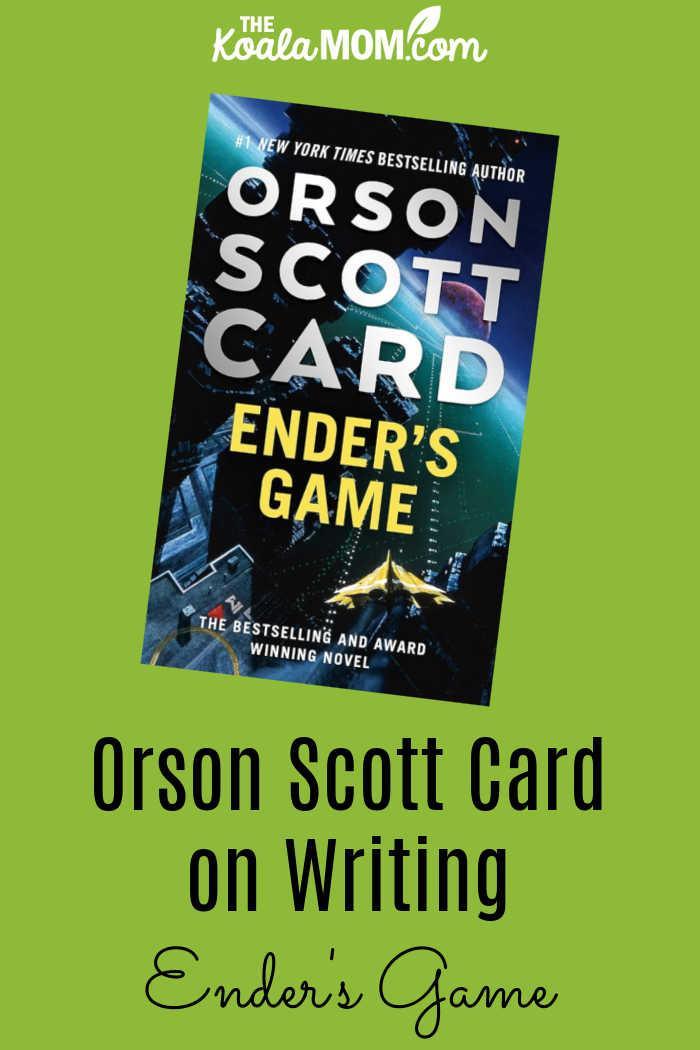We’re huge fans of road trips around here, but a road trip isn’t complete without a book on CD to entertain us while the kilometers pass under our tires. For one trip across Alberta to get to my best friend’s wedding, we grabbed Orson Scott Card’s novel Ender’s Game. I glanced at the cover and said, “Eleven hours? Good thing we’ve got a lot of driving this weekend!”

This post contains affiliate links; as an Amazon associate, I earn from qualifying purchases.
Ender’s Game overview
We waited until my mom joined us to start the story (she was also invited to the wedding, so we carpooled). At first, she was dubious about Ender’s Game—she doesn’t read much sci-fi and found it weird. Several hours down the road, we were a few CDs into the story. I knew Mom was enjoying the story when, as soon as we got into the Jeep after a gas stop, she said, “Turn on the book!”
It was good. In all eleven hours of reading, there wasn’t a sentence that wasn’t necessary. Card created interesting, unique characters and a strange yet believable world. Ender is a six-year-old boy taken to Battle School as earth’s last chance to have a commander able to take on the Buggers—aliens who have invaded earth twice and almost destroyed it. Yet all Ender wants is to go home to his sister, the one person who loves him. Through Battle School, he struggles with loneliness and exhaustion, fighting those who hate him for his brilliance and success, and wishing desperately for a friend.
Orson Scott Card discusses Ender’s Game
The last CD was actually an interview with Orson Scott Card. It was interesting to hear the story behind the novel, how the idea came to him, starting with a short story and then expanding into a novel. He also discussed the process of selling movie rights, and finding a producer who was adapt the book for the big screen without turning Ender into a sixteen-year-old with a girlfriend (sells movies to the dating audience, but wrecks the premise of the story).
Near the beginning of the interview, as Card talked about becoming a writer, he said there are two reasons to do so. One is because you read a really good book and aspire to someday write something that good. The other is that you read a really bad book and know that you can write better than that. I laughed, because that’s so true. Those are the reasons I want to write. Books like Ender’s Game, Daisy Chain and The Passion of Mary-Margaret (which I’m reading right now, after seeing rave reviews of it on several blogs) make me hope the someday I can write like that. And other books (which I won’t name!!!) leave me thinking that if that can get published, then so can I.
Fantasy vs. Sci-Fi
Card also talked about the difference between fantasy and sci-fi, because one editor thought his story was more fantasy than sci-fi. There’s a fine line between the two that I’ve wondered about, but Card had a great differentiation. The genres are similar, but the “strange” elements of fantasy are magical, while the “strange” elements of sci-fi are technical. As Card said, look at the book covers: fantasy will have trees, sci-fi will have rivets.
As he talked about selling the movie rights, Card brought up the way that many people say, “This is such a good book! It should be made into a movie!” He pointed out that people consider movies to be today’s pinnacle art form. I disagree. Lately, I haven’t wanted to watch movies based on books I’ve read, because I know I won’t like it. There are a few movies—like Hoot and the Keirah Knightly version of Pride & Prejudice—that capture the book, but most leave me wishing I hadn’t watched them. Card ended the interview by saying that to him, the best way to get a story was to hear it—as we just had.
More about Orson Scott Card
Orson Scott Card is a best-selling, award-winning American writer who was born in 1951. He is a great-great-grandson of Brigham Young and has served as an LDS Church missionary. He has a master’s degree in English from the University of Utah and has published over 50 novels and 45 short stories. He currently works as an English teacher and has also written two books on writing. He and his wife Kristine have five children, including one lost at birth and one lost to cerebral palsy. He is best known for his science-fiction, and is the only author to win both the Hugo Award and the Nebula Award in the same year. Fans who enjoy Ender’s Game will want to read the entire 5-book saga.

No Responses Yet